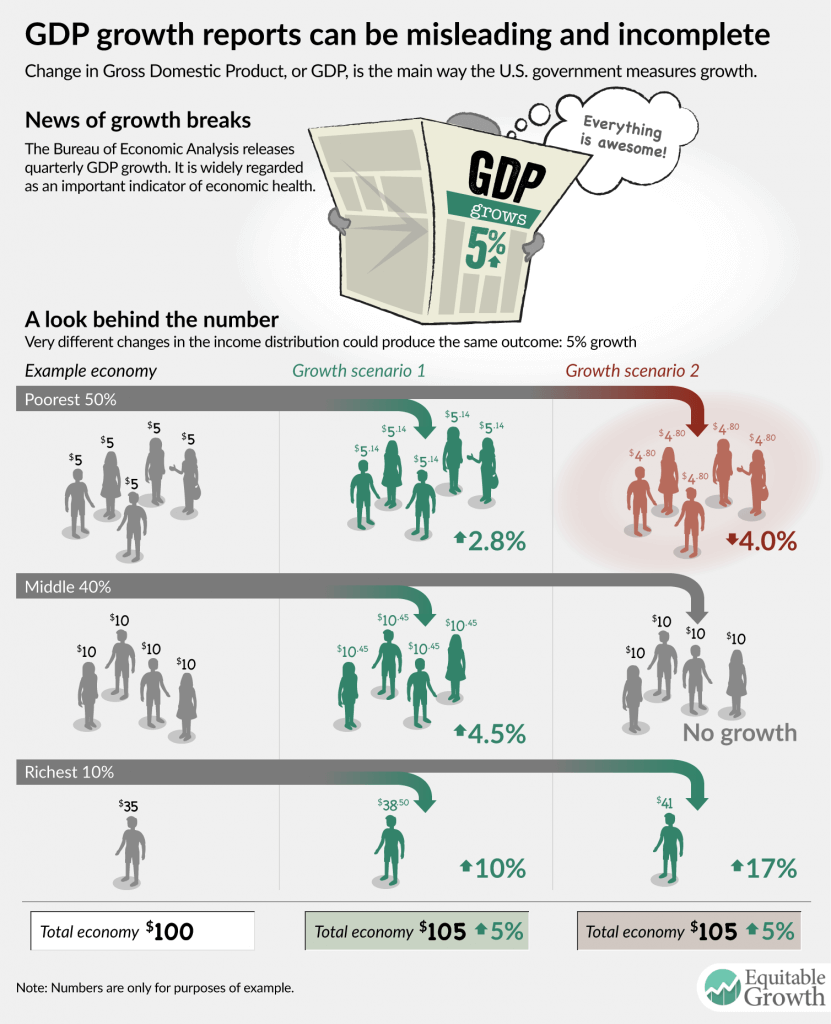Weekend reading: “Labor Day” edition
This is a weekly post we publish on Fridays with links to articles that touch on economic inequality and growth. The first section is a round-up of what Equitable Growth published this week and the second is the work we’re highlighting from elsewhere. We won’t be the first to share these articles, but we hope by taking a look back at the whole week, we can put them in context.
Equitable Growth round-up
Senators Chuck Schumer (D-NY) and Martin Heinrich (D-NM) this past Tuesday introduced the “Measuring Real Income Growth Act of 2018,” which directs the U.S. Bureau of Economic Analysis to report on how the benefits of economic growth in the United States are divided between low-, middle-, and high-income families. Equitable Growth applauds the bill, which implements, in part, the policy agenda laid out in Equitable Growth’s report “Disaggregating Growth: Measuring who prospers when the economy grows.” Heather Boushey and Austin Clemens have written extensively about the need for the quarterly Gross Domestic Product reports to measure what economic growth means for Americans across the income spectrum.
To learn more about the bill and why there’s a need for not just a measure of overall economic growth but how it’s distributed, you can read the coverage in Vox or Paul Krugman’s New York Times column.
More than half of black women’s wage gap in the United States cannot be explained by observable factors such as age or education, as quantified by a recent working paper by economists Mark Paul of the New College of Florida, Darrick Hamilton of the New School, and William Darity Jr. and Khaing Zaw of Duke University and released as part of Equitable Growth’s Working Paper Series. Of the factors that can be observed, racial and gender differences in who works in what occupation and industry explain the largest portion. This is referred to as workplace segregation, and Will McGrew digs into its trends and how workplace segregation not only contributes to the “explained” wage gap, but also how it exacerbates the “unexplained” portion of black women’s wage gap.
Check out Brad Delong’s latest worthy reads from Equitable Growth and around the web.
In a column just in time for Labor Day, Kate Bahn explains the challenge of preserving workers’ bargaining power in a fissured 21st century economy with labor laws designed for the traditional employer-employee relationship of the 20th century. She surveys the latest economic research on the importance of bargaining power for supporting and boosting workers’ wages and working conditions as well as the latest legal scholarship into potential ways forward for designing labor laws that reflect today’s U.S. economy.
Links from around the web
Is the increase in concentration in many U.S. industries responsible for persistently low wages, inflation, and growth? Even if it’s too early for answers, the idea has gained enough credence that it was a topic of discussion among the governors of the Federal Reserve at last week’s Jackson Hole Summit. [nyt]
As poorly designed as it was, Joseph Stiglitz argues that the effects of the fiscal stimulus of December 2017-January 2018 at least demonstrate that the weak recovery from the Great Recession was not due to secular stagnation but rather to an inadequate government stimulus. [project syndicate]
“If we want to grow the U.S. economy, not just redistribute more of its fruits to low-income workers, we need to raise the minimum wage,” says Robert Atkinson. He argues that raising the minimum wage isn’t just the right thing to do from a fairness perspective but also key to encouraging greater innovation and investment by companies, which in turn will spur greater economic growth. [democracy]
Creating a “social wealth fund” modeled on the Alaska Permanent Fund is one possible way to realize a universal basic income, an idea that has recently gained popularity to address growing income inequality and get ahead of anticipated loss of jobs from increasing automation. How to finance such a fund, though, raises questions about whether the cure is any better than the illness it’s supposed to treat. [the intercept]
To learn more about the concept of a universal basic income, you can read or listen to this interview between AEI’s James Pethokoukis and The Atlantic’s Annie Lowrey, who recently published a book on the topic. [aei]
Friday figure

Figure is from Austin Clemens’ “Here’s why you should interpret tomorrow’s GDP growth estimate skeptically”
